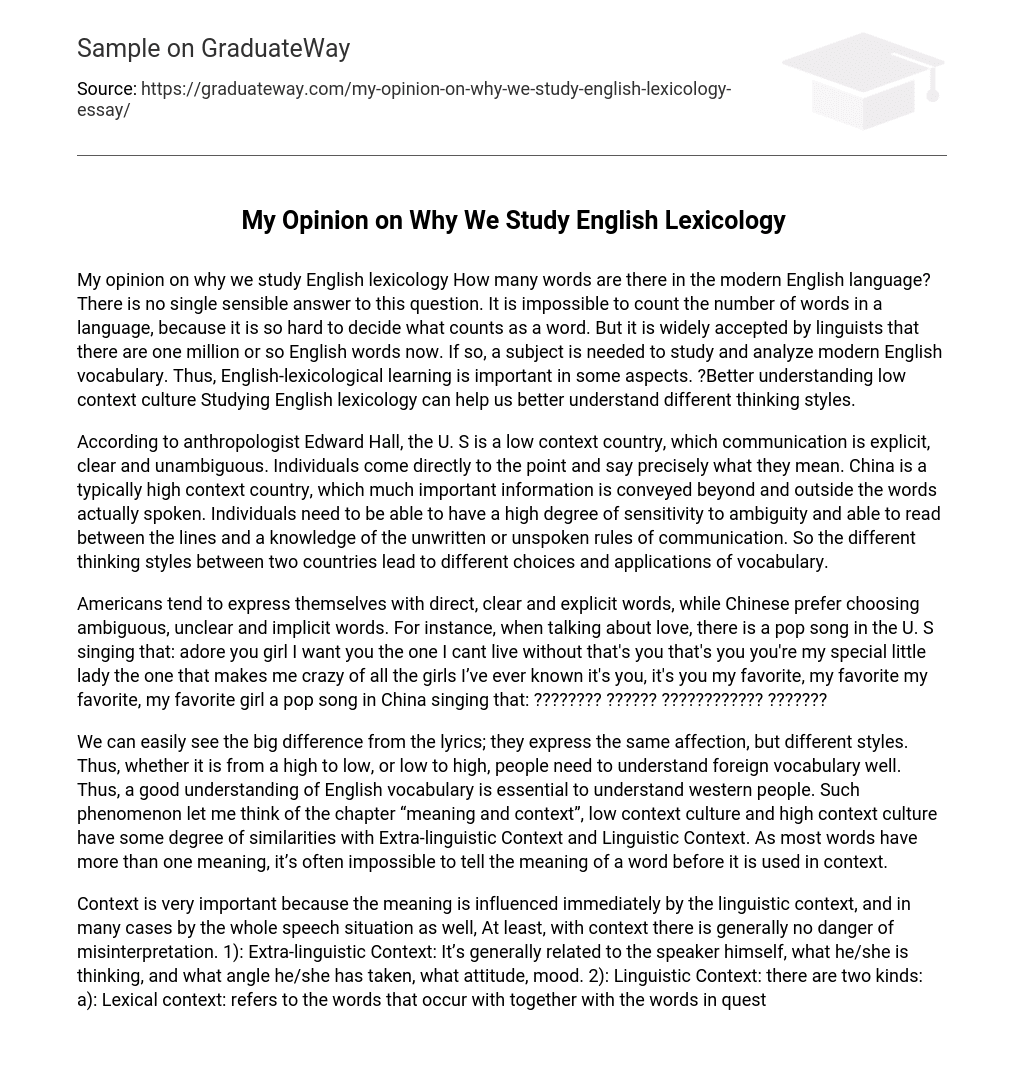My opinion on why we study English lexicology How many words are there in the modern English language? There is no single sensible answer to this question. It is impossible to count the number of words in a language, because it is so hard to decide what counts as a word. But it is widely accepted by linguists that there are one million or so English words now. If so, a subject is needed to study and analyze modern English vocabulary. Thus, English-lexicological learning is important in some aspects. Better understanding low context culture Studying English lexicology can help us better understand different thinking styles.
According to anthropologist Edward Hall, the U. S is a low context country, which communication is explicit, clear and unambiguous. Individuals come directly to the point and say precisely what they mean. China is a typically high context country, which much important information is conveyed beyond and outside the words actually spoken. Individuals need to be able to have a high degree of sensitivity to ambiguity and able to read between the lines and a knowledge of the unwritten or unspoken rules of communication. So the different thinking styles between two countries lead to different choices and applications of vocabulary.
Americans tend to express themselves with direct, clear and explicit words, while Chinese prefer choosing ambiguous, unclear and implicit words. We can easily see the big difference from the lyrics; they express the same affection, but different styles. Thus, whether it is from a high to low, or low to high, people need to understand foreign vocabulary well. Thus, a good understanding of English vocabulary is essential to understand western people. Such phenomenon let me think of the chapter “meaning and context”, low context culture and high context culture have some degree of similarities with Extra-linguistic Context and Linguistic Context. As most words have more than one meaning, it’s often impossible to tell the meaning of a word before it is used in context.
Context is very important because the meaning is influenced immediately by the linguistic context, and in many cases by the whole speech situation as well, At least, with context there is generally no danger of misinterpretation.
- Extra-linguistic Context: It’s generally related to the speaker himself, what he/she is thinking, and what angle he/she has taken, what attitude, mood.
- Linguistic Context: there are two kinds: a): Lexical context: refers to the words that occur with together with the words in question, their meaning are often affected and defined by the neighboring words.
Grammatical Context: in many cases, the meaning is influenced by the structure in which it occurs.
New Words from Proper Names
- Names of people Pasteurize, meaning to destroy germs and check fermentation in milk, beer, or wine by the use of high temperature, comes from the name of Louis Pasteur, the famous French chemist and the father of modern bacteriology.
- Names of places Watergate, a name of a building complex in Washington, D. C now means a scandal.
- Names of books Uncle Tom, is a term of contempt, meaning “a Negro whose behavior toward whites is regarded as fawning or servile”. This word is after the main character, an elderly Neogro slave, in H. B. Stowe’s novel Uncle Tom’s Cabin. 1852
Tradenames Micky Mouse, formerly a trademark used for a cartoon character, is now an adjective, meaning “petty”. Above all, knowledge of word-formation is, therefore, one of the most effective aids to the expanding of one’s vocabulary, and is of great value in inferring word-meaning. In conclusion, lexicology is significant in culture and vocabulary. After half year’s studying, lexicology is no longer a mystery for me. As a matter of fact, I am greatly interested in this subject. And I hope to further study lexicology when becoming a graduate.





